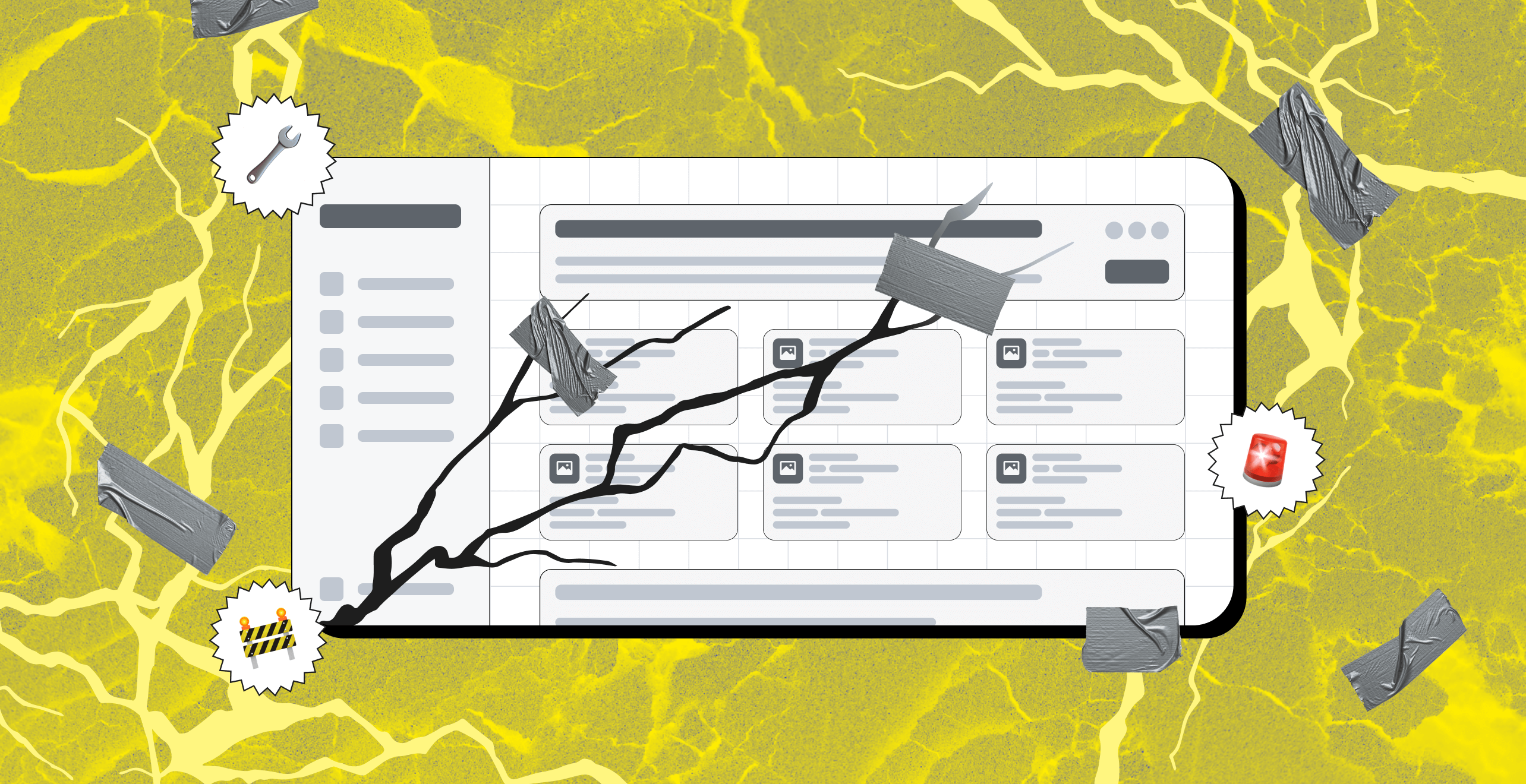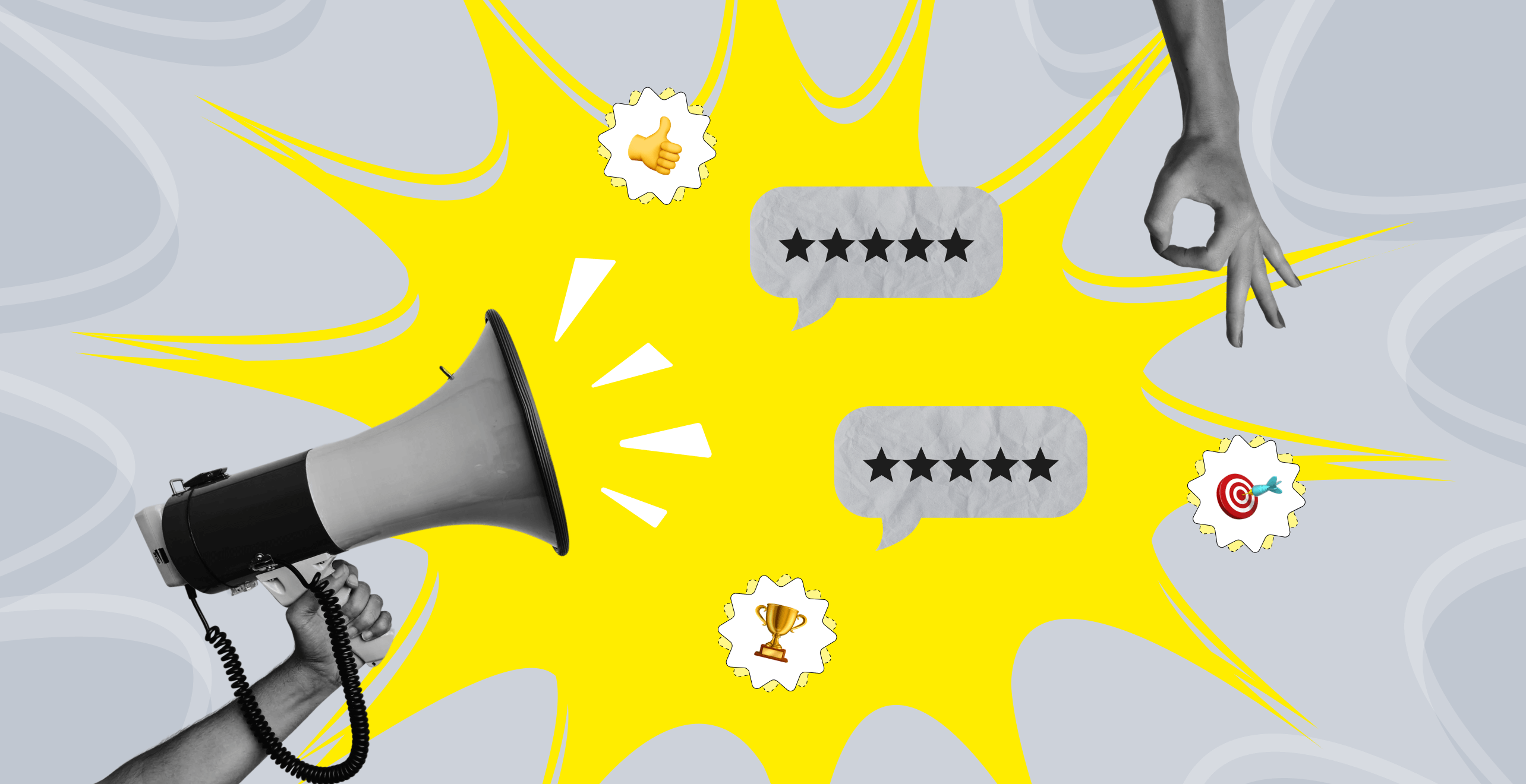AI Personalization in SaaS: Benefits, Challenges, and Trends for 2025

Today's customers have plenty of options, and they won't put up with confusing or impersonal software. They expect apps to be intuitive and feel tailor-made for their needs. Yet, many software companies struggle to deliver on these expectations.
Ask yourself:
- Do your customers have trouble finding the right features?
- Does your welcome tour overwhelm new users instead of helping them?
- Are you losing customers because your app feels like it ignores their needs?
These aren't minor issues, they're major roadblocks that drive customers away. In fact, 88% of users won't return after a single bad experience. This not only stalls your company's growth but also damages your reputation. The main reason behind the issue is trying to make one generic product work for thousands of different people. If your software can't learn and adapt to what each user wants, it won't be very useful, no matter how many features it has.
This is one of the biggest AI challenges for SaaS leaders: How can you give every user a personal experience that keeps them happy and loyal, without a giant team to do it all by hand?
The answer is to use AI personalization.
Key takeaways:
- AI-powered personalization learns from each user to show them the right features at the right time to make the experience more helpful and personal for everyone.
- Getting started with AI requires a Saas business plan: You need to think about user privacy, the tech and costs involved, and how to use it fairly and responsibly.
- Product recommendations, chatbots, smart ad targeting, unique onboarding, and dynamic pricing are the most popular personalization tools.
- Soon, software will be able to predict what users need before they even ask. Companies that get good at this will have a huge advantage.
Understanding AI Personalization in SaaS
Let's say your software has a simple rule: "If a user has the 'Sales' role, show them the 'Leads' dashboard." This is a basic rigid setting. It assumes every salesperson works the same way, which they don't.
Now, how an AI-powered approach works. The system watches how each person actually uses the app:
- what they click on;
- which features they use most;
- where they spend their time.
For example, the AI might learn that one salesperson rarely uses the 'Leads' dashboard but spends most of their day in a specific reporting tool. So, it automatically makes that report easier to access for them.
This is the difference between software you have to adapt to and software that adapts to you. The goal? Creating tools that fit the person—not forcing the person to fit the tool. Incorporating an AI SDR into this process takes it a step further by automating and personalizing outreach, ensuring that each interaction is tailored to the individual, further enhancing the experience.
Benefits of AI-Driven Personalization
The benefits of AI personalization for startups are clear: better customer interaction, faster business growth, and stronger user satisfaction. By tailoring your SaaS to each individual, you can stand out and scale your business more effectively.
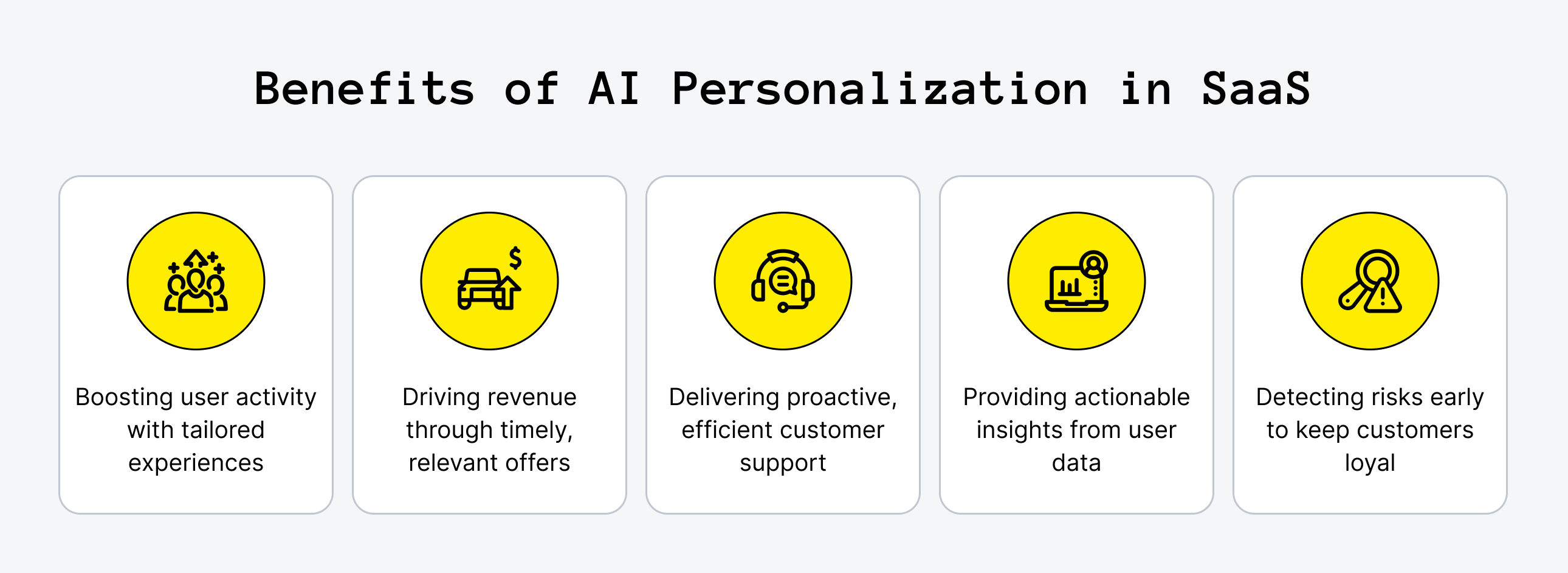
Increased User Engagement
When your app is easier and more helpful to use, people will naturally use it more. AI gets rid of the clutter and shows users exactly what they need and when they need it. They become much happier and more likely to stick around.
A more personal and effective UX can lead to users clicking more and signing up more often, which keeps them active and engaged for the long haul. It can even triple your conversion rates.
Revenue Growth
A personalized experience leads to more money, as 80% of people are eager to spend more for a good experience. When you show users the right features or suggest the right plan upgrade at the perfect time, they're more likely to buy.
For example, the AI might notice a customer is using your standard plan to its limits and suggest an upgrade when they need it most.
Enhanced Customer Support
AI can also completely change your customer support. Instead of waiting for a customer to get frustrated and ask for help, AI can spot when someone is struggling and offer help before they ask. And when a customer does need to talk to someone, AI chats can handle the simple questions or not-so-simple ones.
It might sound like a bad idea, ten years ago, back when chatbots caused nothing but frustration, but today's bots, when trained well, are not like their ancestors. Building an AI assistant today means creating a system that learns from both external domain-specific sources and your knowledge base and has much better problem-solving skills. For example, tools like Lyro by Tidio show how AI-powered support can deliver reliable, human-like responses at scale by learning from verified knowledge sources and aligning replies with a company’s brand voice.
With a good bot, you will free up your human support team to focus on the tougher problems. On the other hand, your users will get faster answers and get happier.
Data-Driven Decision Making
To make things personal, AI collects data on how people use your product, which is a goldmine of information. It helps with feature prioritization by revealing which functionalities users engage with most, where people get stuck, and what your customers really want.
This is the main thing behind personalization. You have everything you need to make smarter decisions about what to build next instead of guessing.
Reduced Churn
Churn when customers cancel their subscriptions is one of the biggest SaaS challenges. Leveraging AI personalization in SaaS is a powerful way to fight it. When your product feels like it was made for them and only for them, customers are much less likely to leave.
What algorithms do for reducing churn is spotting the warning signs that a customer might be about to cancel, such as:
- a sudden drop in how often they log in (like from daily to weekly);
- they stop using the key features they once relied on;
- they start visiting the "cancel subscription" or pricing pages;
- a sudden increase in support tickets or negative feedback;
- they ignore new feature announcements and product updates.
So, you know when it's time to step in and do something before it's too late. And at this very moment, you will need a set of tools ready for implementation.
Need a hand with generative AI development?
Upsilon is a reliable tech partner with a big and versatile team that can give you a hand with creating an AI solution.

How AI Can Enhance Customer Experience
How does AI personalization actually look inside your app? Let's dive into some of the key ways AI transforms the customer journey.
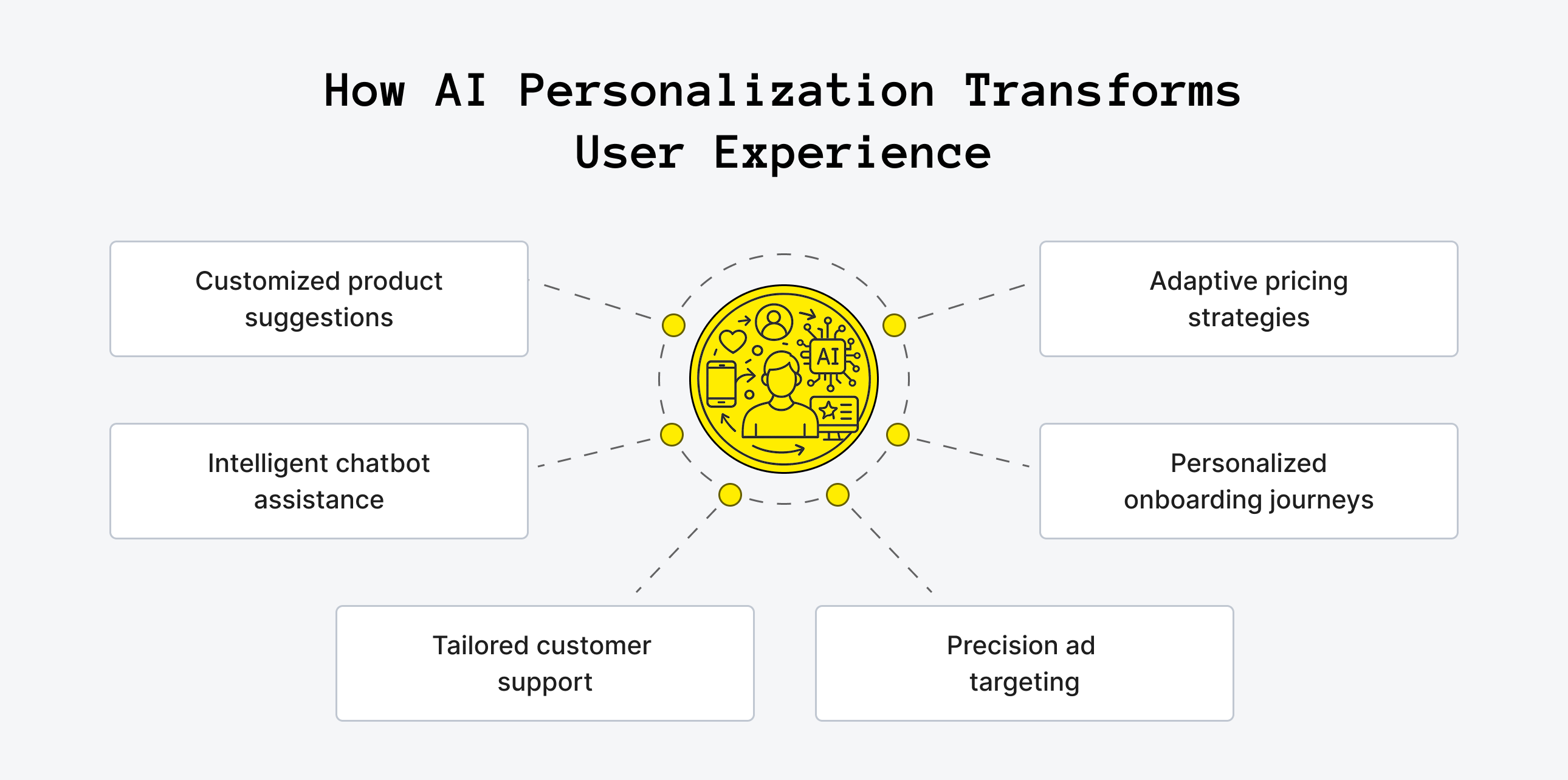
Customized Product Recommendations
This is more than a "you might also like" feature. In a project management app, for instance, the AI can look at the type of project a user is working on and their role in the company. Then, it can suggest helpful templates or integrations with other tools they use, like Slack or Google Drive. That's how users get to discover useful functionalities they might have missed otherwise.
AI-Powered Chatbots
As said, creating an AI chatbot today means going far beyond answering simple questions. These bots use artificial intelligence to understand what a user is asking for, even if they don't use the perfect keywords.
A user could say, "I need a report of my team's activity from last month for the European team," and the chatbot will understand and create that exact report. It turns a complicated task into a simple conversation.
Personalized Customer Support
Also, worth mentioning again, AI makes your human support agents even better. When a customer contacts support, the AI can instantly pull up all their recent activity and past issues. It can even guess what the problem might be. The support agent gets all the information they need to solve the problem, and doesn't need to ask the customer to repeat themselves. This is where AI humanizer plays a key role, enhancing the human touch by making AI interactions feel more intuitive and personalized.
Ad Targeting
If you use ads to find new customers on Google or LinkedIn, AI can make your marketing budget for startups go much further. It analyzes your best current customers and then helps you find more people like them online. Your ads are shown to people who are most likely to be interested in your product, which leads to more sign-ups and less wasted money. Tools like Tagshop AI support this shift by helping SaaS and ecommerce teams create AI UGC videos that align with personalized journeys and build trust at the decision stage.
Plus, when you pick an advertising strategy like maximizing conversions, you leverage AI-driven tools—like AI video ads that are optimized in real time using analytics from your website and the platform’s internal data. It learns how users who made conversions on your website behave and shop, and looks for common patterns out there to bring you new customers.
Tailored Onboarding
A good first impression is a big factor in the initial sale, but you never know what this particular user needs right now, and it's hardly possible to ask every single person visiting your website about it. Instead of giving every new user the same tour, AI can create a personalized onboarding experience.
For example, a manager who signs up will be shown how to invite their team, while a developer will be shown how to connect to the API. Every user gets to their essential toolkit much faster.
Dynamic Pricing
For some types of SaaS, AI can even help with pricing by offering different prices or special discounts based on things like usage or loyalty. These techniques aren't just about retention, they're powerful ways to monetize your app more effectively. You can borrow some of the strategies from the gaming industry and popular mobile apps, where they test the highest and lowest possible prices as often as they have lunch.
Dynamic pricing works well for preventing churn. For example, if you host a video platform, you could offer a small discount to a user who is at risk of canceling their plan.
Real-World Examples of AI-Powered Personalization
You've 100% already seen this technology in action in your favorite apps. Look at a few famous AI personalization examples:
Netflix
Netflix is the king of personalization because it goes beyond recommending movies and shows. It changes the cover image it shows you for a movie based on what it thinks you'll find most interesting. It's a good example of how AI learns from everything you watch, and also a good example of how a company makes decisions to get the most out of the industry-specific element: visuals.
In fact, Netflix uses AI not only as a recommendation tool but as the central nervous system for its entire content, marketing, and presentation strategy. Their viewer data is a massive competitive advantage.
Spotify
Spotify's "Discover Weekly" playlist is a perfect example of AI-driven personalization, too. It creates a unique playlist for every single user every week, filled with new music it thinks they'll love. For many, it feels like a gift from a friend who knows your music taste better than you do.
It's just a small feature that Spotify has come with. Some of the most viral personalization features ever have been forced by Spotify, too. Yes, we're talking about the New Year's Spotify Wrapped, which millions of people are waiting for harder than for the Christmas gifts each year.
Salesforce Einstein
Next is the B2B giant, Salesforce, a popular tool for sales teams. It uses AI to help its users work smarter, and has named its AI Einstein. A couple of the things Einstein can do are predict which sales leads are most likely to become customers and suggest what a salesperson should do next to close a deal, like:
- send a specific follow-up email;
- making a phone call;
- offer a discount.
That's why Salesforce is not a passive database for storing information about customers anymore. It's an intelligent partner that guides strategic decisions and boosts revenue.
Adobe Sensei
Adobe, the company behind Photoshop and other creative tools, uses its AI platform, Sensei, to power smart features. In Photoshop, it helps with complex photo edits very fast. Content-Aware Fill, for example, allows a user to remove a major object from a photo with one click, as the AI rebuilds the background.
For businesses, it personalizes their websites for different visitors by showing them the most relevant products, articles, or offers to increase engagement and conversion. Sensei also helps marketers and gives them the tools for predicting which images, headlines, or ad copy will perform best for different audience segments.
All these examples are surely inspiring, but there are a few things you need to know before you jump into the development of your brand-new AI-powered personalization system.
Challenges of Implementing AI Personalization in SaaS
AI tools for SaaS customer personalization are, indeed, powerful, though it's not always easy to implement them. You need to watch out for data privacy, tech complexity, resource intensity, and the ethical side of things. Let's quickly go through why these matter.
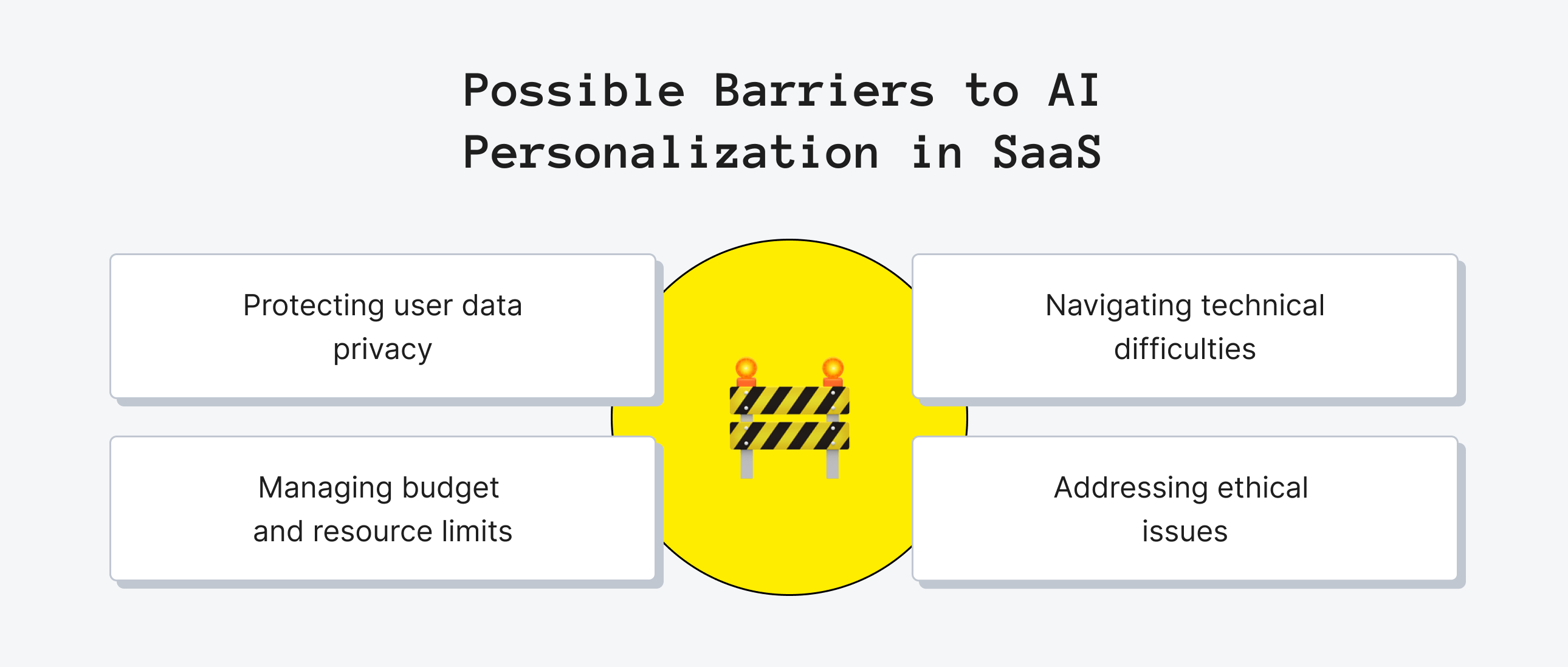
Data Privacy Concerns
To personalize an experience, you need user data, and this is a big responsibility. You have to follow privacy laws like GDPR and make sure you're protecting your users' information. Being transparent with users about how you use their data is what builds trust and keeps you protected from fines.
Technical Complexity
Implementing AI personalization in SaaS is not simple; in fact, it's quite complicated. It takes skilled engineers and data scientists to create and manage the technology, ensure security, no bias, and much more. If you're a smaller company, it can be challenging to find the right talent and build the right systems.
One of the options you have is to go for a dedicated team that specializes in AI development and will need less time to understand what kind of tech you need.
Costs and Resource Constraints
Plus, AI development costs are high, though you have some really good out-of-the-box solutions that you can install or integrate fast. But in general, you need to pay for talented people, powerful computers, and special tools. It's important to have a clear plan and make sure that the benefits you get from personalization will be worth the investment.
Spoiler: They likely will. Estimations show that you potentially get a 9,900$ ROI for every dollar invested in the UX development.
Ethical Considerations
Finally, it's important to use artificial intelligence responsibly because, again, AI systems learn from data, and if the data has biases, the AI can learn these biases, too. Bias leads to unfair outcomes, and companies need to be careful to build fair systems and be open about how their AI works.
Future Trends in AI-Driven Personalization
AI technology is moving fast in every aspect, like any goldmine that has turned out to be a long-term source of profit. Some key AI personalization trends for 2025 include:
- Hyper-personalization. In the future, personalization will get even more personal. It will use real-time information, like a user's location or time of day, to create an experience that's suited for that exact moment.
- Predictive personalization. Soon, AI will be able to predict what you need before you even know you need it. Yes, your software will automatically pull up the exact report you need right before a big meeting. The artificial intelligence's goal is to make things so easy, you barely have to click at all.
- Cross-channel personalization. User experience with a company doesn't happen in one place. It's on your website, your mobile app, and in your emails. In the future, AI will connect all of these, so your experience is consistent everywhere.
As privacy becomes even more important, new AI techniques are also being developed that can personalize experiences and not collect sensitive personal data. Companies will build trust and deliver a great experience at the same time.
Apple excels at this. When your iPhone keyboard suggests the next word or Siri suggests calling someone you often contact at a certain time, this is happening on your device. The AI learns your personal language patterns, your relationships, and your habits locally. Apple's servers never see the content of your messages to learn this.
AI personalization for SaaS startups is no longer a novelty—it's a fundamental expectation. If you haven't yet implemented these core personalization features, you risk failing to meet the standards modern users demand in digital products.
Seeking help with building your product?
Upsilon has an extensive talent pool made up of experts who can help bring your AI ideas to life!

Concluding Thoughts on AI Personalization in SaaS
AI personalization is no longer a cool idea for SaaS products, but a must-have if you want to keep up with what users already expect. But focusing on each user to build better products, make customers happier, and grow their business faster will pay off.
Ready to harness the power of personalization for your SaaS platform? At Upsilon, we're here to help you build custom AI-first solutions from the ground up or enhance your existing software with advanced AI integrations. Explore our generative AI development services to see how we can help your product stand out in a market.
Have a project in mind or want to learn more? Feel free to contact us anytime. Let's discuss SaaS growth strategies fueled by AI personalization for YOUR users!
FAQ
to top












